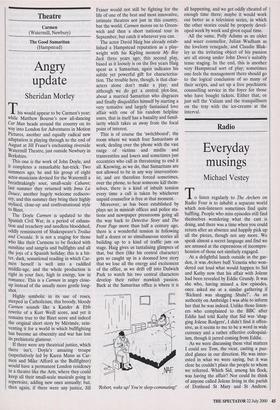Theatre
Carmen (Watermill, Newbury) The Good Samaritan (Hampstead)
Angry update
Sheridan Morley
This would appear to be Carmen's year; while Matthew Bourne's new all-dancing Car Man heads around the country on its way into London for Adventures in Motion Pictures, another and equally radical new adaptation is playing through to the end of August at Jill Fraser's enchanting riverside Watermill Theatre, just outside Newbury in Berkshire.
This one is the work of John Doyle, and it completes a remarkable hat-trick. Two summers ago, he and his group of eight actor-musicians devised for the Watermill a breathtakingly sour, small-scale Cabaret; last summer they returned with Irma La Douce, another hugely welcome rediscov- ery, and this summer they bring their highly stylised, close-up and confrontational style to Bizet.
The Doyle Carmen is updated to the Spanish Civil War, in a period of exhaus- tion and treachery and needless bloodshed, oddly reminiscent of Shakespeare's Troilus and Cressida. It is not a staging for those who like their Carmens to be flecked with sunshine and sangria and bullfights and all the joys of a Spanish holiday; this is a bit- ter, dark, sensational reading in which Car- men herself is well into a raddled middle-age, and the whole production is right in your face, high in energy, low in romance. This is a Carmen in angry close- up instead of the usually more gentle long- shot.
Highly symbolic in its use of roses, steeped in Catholicism, this broody, bloody Carmen sounds like a Kander & Ebb rewrite of a Kurt Weill score, and yet it remains true to the Bizet score and indeed the original short story by Merirnee, rein- venting it for a world in which bullfighting has become an obscenity and war has lost its prehistoric glamour.
If there were any theatrical justice, which there isn't, Doyle's amazing troupe (superlatively led by Karen Mann as Car- men and Mike Afford as the Bullfighter) would have a permanent London residency in a theatre like the Arts, where they could keep all their small-scale musicals going in repertoire, adding new ones annually; but, then again, if there were any justice, Jill Fraser would not still be fighting for the life of one of the best and most innovative, intimate theatres not just in this country, but the world. Carmen moves on to Green- wich and then a short national tour in September, but catch it wherever you can. The actor David Haig has already estab- lished a Hampstead reputation as a play- wright with his Kipling memoir My Boy Jack three years ago; this second play, based as it loosely is on the five years Haig spent as a Samaritan, again indicates his subtle yet powerful gift for characterisa- tion. The trouble here, though, is that char- acters alone don't make a play; and although we do get a central plot-line, about a married Samaritan who disgraces and finally disqualifies himself by starting a very tentative and largely fantasised love affair with one of his random helpline users, that in itself has a banality and famil- iarity which takes us away from the focal point of interest. This is of course the 'switchboard', the room where we watch four Samaritans at work, dealing over the phone with the vast range of victims and misfits and transvestites and losers and sometimes just eccentrics who call in threatening to end it all. Knowing, as we do, that Samaritans are not allowed to be in any way intervention- ist, and are therefore forced sometimes, over the phone, to hear someone kill them- selves, there is a kind of inbuilt tension every time a call is taken by whichever unpaid counsellor is free at that moment.
Moreover, as has been established by plays set in minicab offices and police sta- tions and newspaper pressrooms going all the way back to Detective Story and The Front Page more than half a century ago, there is a wonderful tension in following half a dozen or so simultaneous stories all building up to a kind of traffic jam on stage. Haig gives us tantalising glimpses of that, but then (like his central character) gets so caught up in a doomed love story that we lose all the energy and excitement of the office, as we drift off into Dulwich Park to watch his two central characters develop their rather mawkish passion. Back at the Samaritan office is where it is Robert, wake up! You're sleep-commuting!' all happening, and we get oddly cheated of enough time there; maybe it would work out better as a television series, in which the other stories could be properly devel- oped week by week and given equal time.
All the same, Polly Adams as an older and wiser counsellor, Julian Wadham as the lovelorn renegade, and Claudie Blak- ley as the irritating object of his passion are all strong under John Dove's suitably tense staging. In the end, this is another very Hampstead sort of play; sometimes one feels the management there should go to the logical conclusion of so many of their scripts, and set up a free psychiatric counselling service in the foyer for those who have bought tickets. Either that, or just sell the Valium and the tranquillisers on the tray with the ice-creams at the interval.


























































 Previous page
Previous page